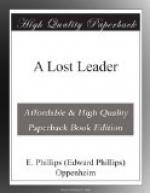“There is a woman,” he said, “whose life I helped to wreck—not in the orthodox way,” he added, with a note of scorn in his tone, “but none the less effectually. The one recompense I never thought of offering her was marriage. I have seen that, despite all my efforts to aid her, her life has been a failure. Her friends have been the wrong sort of friends, her life the wrong sort of life. What it was that was dragging her downwards I never guessed, for she, too, in her way, was a proud woman. To-day she sent for me. What passed between us is her secret as much as mine. I can only tell you that before I left I had asked her to marry me.”
“I think,” she said, calmly, “that you need tell me no more.”
“There is very little more that I can tell you,” he answered. “I have no affection for her, and she has refused to marry me. But she remains—between us—irrevocably!”
“You are lucidity itself,” she replied. “Will you forgive me if I leave you? I am scarcely used to this sort of situation, and I should like to be alone.”
“Go by all means, Berenice,” he answered. “You and I are better apart. But there is one thing which I must say to you, and you must hear. What has passed between you and me is the epitome of the love-making of my life. You are the only woman whom I have desired to make my wife. You are the only woman whom I have loved, and shall love until I die. I can make you no reparation, none is possible! Yet these things are my justification.”
Berenice had turned away. The passionate ring of truth in his tone arrested her footsteps. She paused. Her heart was beating very fast, her coldness was all assumed. It was so much happiness to throw away, if indeed there was a chance. She turned and faced him, nervous, gaunt, hollow-eyed, the wreck of his former self. Pity triumphed in spite of herself. What was this leaven of weakness in the man, she wondered, which had so suddenly broken him down? He had only to hold on his way and he would be Prime Minister in a year. And at the moment of trial he had crumpled up like a piece of false metal. A wave of false sentiment, a maniacal hyper-conscientiousness, had been sufficient to sap the very strength from his bones. And then—there was this other woman. Was she to let him go without an effort? He might recover his sanity. It was perhaps a mere nervous breakdown, which had made him the prey of strange fancies. She spoke to him differently. She spoke once more as the woman who loved him.
“Lawrence,” she said, “you are telling me too much, and not enough. If you want to send me away I must go. But tell me this first. What claim has this woman upon you?”
“It is not my secret,” he groaned. “I cannot tell you.”
“Leslie Borrowdean knows it,” she said. “I could have heard it, but I refused to listen. Remember, whatever you may owe to other people you owe me something, too.”




